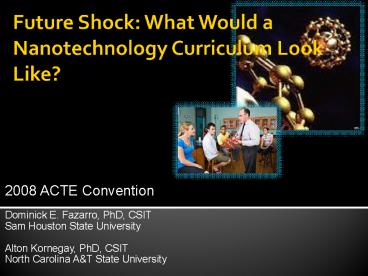Future Shock: What Would a Nanotechnology Curriculum Look Like - PowerPoint PPT Presentation
1 / 12
Title:
Future Shock: What Would a Nanotechnology Curriculum Look Like
Description:
Development: The Georgia Institute of Technology Model. http://www.nanohub.org/resources/2251 ... (NANO 410) Principles of Nanofabrication Technology ... – PowerPoint PPT presentation
Number of Views:150
Avg rating:3.0/5.0
Title: Future Shock: What Would a Nanotechnology Curriculum Look Like
1
Future Shock What Would a Nanotechnology
Curriculum Look Like?
- 2008 ACTE Convention
- Dominick E. Fazarro, PhD, CSIT
- Sam Houston State University
- Alton Kornegay, PhD, CSIT
- North Carolina AT State University
2
We must prepare the 21st century workforce to
compete globally with emerging technologies. In
order to prepare for nanotechnology, educators
should be proactive not reactive to new
technologies create programs cutting-edge
curriculum at post-secondary schools.-Fazarro
3
The NSF estimates that by the year 2015 there
will be a need for two million workers worldwide
in the fields of nanoscience and nanotechnology.
Source Diane Palma (2007). K-12 nanotechnology
education outreach for workforce Development The
Georgia Institute of Technology Model.
http//www.nanohub.org/resources/2251/
4
How do we prepare for Nano Curriculum?
(proactive thinking)
- Understanding the demographic shift in the U.S.
(more diverse) - Understanding the nature of nanotechnology
- Cognizant of the implications
- Understanding what levels of material should be
taught through research - Understanding of what areas to integrate
- Understanding the roles for 2-yr 4-yr schools
will play in the educating students
5
How do we prepare for a Nano Curriculum?
(proactive thinking)
- Understanding the demographic shift in the
U.S.(more diverse) - In consensus that Math and Science is more
prevalent than ever before - Designing curriculum that is socially conscience
and can be integrated into the fabric of society
6
How do we prepare for a Nano Curriculum?
(proactive thinking)
- Understanding the nature of nanotechnology
- History of development
- Research application
- Research on safety issues
- Consumer use
7
How do we prepare for a Nano Curriculum?
(proactive thinking)
- Cognizant of the implications
- Dangers-Safety practices
- Ethic and moral practices
- Understand for the advancement of humankind
8
How do we prepare for a Nano Curriculum?
(proactive thinking)
- Understanding what levels of material should be
taught through research? - Physics
- Chemistry
- Electrical
- Management (Logistics)
- Safety
- Applied Technology
9
How do we prepare for a Nano Curriculum?
(proactive thinking)
- Understanding the roles for 2-yr 4-yr schools
will play in the educating students - 2yr Schools
- Highly skilled nano-technicians
- Preparing students for articulation to 4-yr
program - 4yr Schools
- Researchers
- Nano Managers (Safety, Logistics, Fabrication)
- Preparation for doctoral work
10
How do we prepare for a Nano Curriculum?
(proactive thinking)
- Understanding of what areas to integrate
Source Fazarro, D.E. NanoTX Conference October
2-3, 2008
11
Developing the Curriculum
- Example of courses (B.S.-Applied
Nanotechnology-Emphasis in Fabrication) - (NANO 100)The History of Nanotechnology
- (NANO 200) Ethical Issues of Nanotechnology
- (NANO 210) Issues of Nanomaterial Safety
- (NANO 220) Legal Issues and commercialization of
Nanomaterials - (NANO 300) Theoretical Foundation of
Nanotechnology - (NANO 310) Nanomaterials-Physics
- (NANO 320) Nanomaterials-Chemistry
- (NANO 330) Nanomaterials-Electromechanical
- (NANO 340) Introduction to Biotechnology
- (NANO 400) Introduction to Nanomaterial
Fabrication Equipment - (NANO 410) Principles of Nanofabrication
Technology - (NANO 420) Principles of Nanoscaled Material
Processing - (NANO 430) Managing and Marketing of
Nanomaterials in Products
12
Questions Comments































